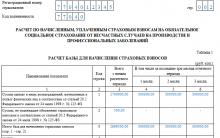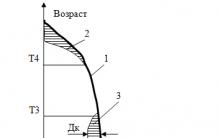Take advantage interest calculator for using other people's in cash for 2020! Get a detailed estimate on the Legal Ship portal law firm!
This is universal penalty, which can be declared in almost all social relations associated with the emergence of property claims and any kind of damage.
You need to know the date the debt was incurred and the amount of the debt. Indicate in the appropriate sections of the calculator if you had payments during the period or if additional amounts were taken out.
Choose the one you need federal district where the disputes arose public relations, and the system will automatically select interest rates from the directory, established by the Bank Russia.
Our online calculator for Article 395 of the Civil Code of the Russian Federation 2020 will help you easily find out the amount of interest.
Including for the entire period of using a loan, lease, any type of damage and losses, taking into account partial repayment and increase in debt.
You no longer have to spend a long time and painstakingly studying complex aspects of legislation and judicial practice regulating issues financial relations. You can safely save on contacting a lawyer or lawyer to obtain a calculation of the amount of debt.
Use the Legal Ship law firm service, and you can instantly receive a calculation that will be useful to you in resolving a dispute and restoring your violated rights.
TIn this way, you can save a lot of your time studying legal requirements. Ourinterest calculator for using other people's money on2020 year will instantly make the necessary calculation! Fill out the required fields and see how simple and convenient it works. Contact our lawyers for help in drafting any competent legal document.
Russian Federation
CIVIL CODE OF THE RUSSIAN FEDERATION (PART 1)
Chapter 25. Liability for violation of obligations
Article 395. Liability for failure to fulfill a monetary obligation
For the use of someone else's funds as a result of their unlawful retention, evasion of their return, other delay in their payment, or unjust receipt or savings at the expense of another person, interest on the amount of these funds is subject to payment. The amount of interest is determined by those existing in the place of residence of the creditor or, if the creditor is legal entity, at its location, published by the Bank of Russia and the average rates that occurred during the relevant periods bank interest by deposits individuals. These rules apply unless a different interest rate is established by law or agreement.
(clause 1 as amended) Federal Law dated 03/08/2015 No. 42-FZ)
If the losses caused to the creditor by the unlawful use of his funds exceed the amount of interest due to him on the basis of paragraph 1 of this article, he has the right to demand compensation from the debtor for losses in the amount exceeding this amount.
Interest for the use of other people's funds is charged on the day the amount of these funds is paid to the creditor, unless by law or otherwise legal acts or the agreement does not establish a shorter period for accrual of interest.
In the event that the agreement of the parties provides for a penalty for non-performance or improper performance monetary obligation, the interest provided for in this article is not subject to collection, unless otherwise provided by law or agreement.
(Clause 4 introduced by Federal Law No. 42-FZ dated 03/08/2015)
The accrual of interest on interest (compound interest) is not permitted unless otherwise provided by law. For obligations performed by the parties entrepreneurial activity, application compound interest is not permitted unless otherwise provided by law or agreement.
(Clause 5 introduced by Federal Law dated 03/08/2015 No. 42-FZ)
If the amount of interest to be paid is clearly disproportionate to the consequences of the violation of the obligation, the court, at the request of the debtor, has the right to reduce provided for by the agreement interest, but not less than up to the amount determined based on the rate specified in paragraph 1 of this article.
(Clause 6 introduced by Federal Law dated 03/08/2015 No. 42-FZ)
Resolution of the Plenum of the Supreme Court of the Russian Federation and the Plenum of the Supreme Arbitration Court of the Russian Federation
No. 13/14 dated 10/08/1998
"On the practice of applying the Civil Code of the Russian Federation on interest for the use of other people's funds"
When calculating the payable annual interest By refinancing rate Central Bank Russian Federation the number of days in a year (month) is taken to be 360 and 30 days, respectively, unless otherwise established by agreement of the parties, rules binding on the parties, as well as business customs. Interest accrues until actual execution a monetary obligation, determined on the basis of the conditions on the procedure for payments, the form of settlements and the provisions of Article 316 of the Civil Code of the Russian Federation on the place of fulfillment of the monetary obligation, unless otherwise established by law or agreement of the parties.
“You are a rather vulgar person,” Bender objected, “you love money more than necessary.”
- Don’t you like money? - Ippolit Matveevich howled in the voice of a flute.
- I don’t like it.
- Why do you need sixty thousand?
- Out of principle!
(from the film “12 Chairs”)
Not only in Tax code The Russian Federation makes dozens of changes per year. The Civil Code also does not go unnoticed. We often pay attention to the latest developments in corporate legislation, today we'll talk about more ordinary things - interest for late fulfillment of a monetary obligation. Article 395 of the Civil Code of the Russian Federation is known not only to lawyers, but also to entrepreneurs, because the rule about the need to pay penalties based on the refinancing rate has long been taken for granted. Changes to the procedure for calculating interest under Article 395 of the Civil Code of the Russian Federation were made twice, with a difference of less than a year.
In order to simplify your life and protect you from mistakes in such trifles that affect the building of relationships with counterparties when formulating the terms of contracts, we will clarify some points regarding the calculation of so-called “legal interest”.
Interest for failure to fulfill a monetary obligation Art. 395 of the Civil Code of the Russian Federation.
Starting from 06/01/2015 and, we risk limiting the period, to 03/24/2016. There was confusion in the application of this article, which was further aggravated by the appearance of Article 317.1 of the Civil Code of the Russian Federation. Federal Law of 03/08/2015 No. 42-FZ was introduced new order- interest under Art. 395 began to be calculated not on the basis of the refinancing rate, but in accordance with the “average rates” of bank interest on deposits of individuals at the location of the lender. Changes in the settlement procedure concerned legal relations that arose after June 1, 2015. The Bank of Russia monthly updated bank interest indicators for calculation under Art. 395 of the Civil Code of the Russian Federation, and for each period of delay, interest, if necessary, had to be calculated according to its indicator.
Obviously, this procedure was inconvenient, so already from 08/01/2016. interest under Art. 395 of the Civil Code of the Russian Federation is prescribed to be calculated at the key rate of the Bank of Russia in force during the relevant periods. Let us explain that, in fact, the key rate replaced the refinancing rate, so we can safely say that there has been a return to the old procedure for calculating interest for the use of other people’s funds, which was in effect until June 1, 2015.
Let us designate the periods during which different rules for calculating interest for failure to fulfill a monetary obligation under Art. 395 Civil Code:
for the periods arising until 05/31/2015, - we calculate at the current refinancing rate;
from 06/01/2015 until 07/31/2016- at average bank interest rates for individuals, incl. and for failure to fulfill a monetary obligation arising on the basis of a contract concluded before 06/01/2015. agreement, in relation to periods of delay that occurred from 06/01/2015, and
from 01.08.2016. to the present - at the key rate of the Bank of Russia.
However, a different interest rate can be established in the contract itself, which we recommend doing to simplify your life in case you need to use Art. 395 Civil Code. When establishing a different rate in the contract, it is necessary to indicate that we are talking specifically about interest under Art. 395 of the Civil Code of the Russian Federation, otherwise we may be talking about a penalty, which excludes the application of Art. 395, unless otherwise stipulated by the parties in the agreement (clause 4 of article 395 of the Civil Code of the Russian Federation). Previously, there was no such indication in the Civil Code, which means that the calculation of interest for the use of other people’s funds (Article 395 of the Civil Code of the Russian Federation) and penalties (Article 330 of the Civil Code of the Russian Federation) did not contradict each other.
Please keep in mind that in trial amount recovered penalties and interest for failure to fulfill a monetary obligation may be reduced by the court if the collected penalty is disproportionate to the consequences of failure to fulfill the obligation in accordance with Art. 333 Civil Code of the Russian Federation. The limits for reducing the amount of interest charged for the use of other people's funds are established in clause 6 of Art. 395 of the Civil Code of the Russian Federation: the court cannot reduce interest under Art. 395 of the Civil Code of the Russian Federation, if the creditor applied their calculation established in the code itself (that is, based on the key rate). If the agreement provides for a different procedure for calculating interest, the court may reduce the amount of the amount collected at the request of the debtor, but the possibility of reduction is limited by the amount of interest that would be obtained if the calculation specified in paragraph 1 of Art. 395 of the Civil Code of the Russian Federation. A similar restriction in terms of reducing the amount of the penalty under Art. 333 of the Civil Code of the Russian Federation would provide even more guarantees of discipline in terms of fulfilling obligations and understanding whether it makes sense to collect penalties in court.
Now let's move on to Article 317.1 of the Civil Code of the Russian Federation
This article “debuted” as a new norm Civil Code RF from 06/01/2015 until 08/01/2016. was perceived as a “distorting mirror” of Article 395. From August 1, 2016 it is valid new edition:
In cases where the law or agreement stipulates that interest is subject to accrual on the amount of a monetary obligation for the period of use of funds, the amount of interest is determined by the key rate of the Bank of Russia in effect during the relevant periods (legal interest), unless a different amount of interest is established by law or agreement.
clause 1 art. 317.1 of the Civil Code of the Russian Federation
Interest under art. 317.1 of the Civil Code of the Russian Federation applies to relations in which the participants are both commercial organizations, individual entrepreneurs, and individuals (from 01.08.2016) and are accrued only on monetary obligations in the following order:
from 06/01/2015 to 07/31/2016- “automatically”, except for cases where non-application is provided for by law or agreement, regardless of the parties’ violation of their obligations under the agreement at the refinancing rate,
from 01.08.2016 only if this is provided by law or agreement, at the key rate.
Monetary obligations arise primarily from buyers (customers). The seller (performer) may also be required to pay this interest, but only if an obligation arises to return the previously received advance. The very fact of receiving an advance will not be the basis for the emergence of a monetary obligation and Art. 317.1 does not need to be applied (Letter of the Ministry of Finance of the Russian Federation dated December 9, 2015 N 03-03-РЗ/67486). In the same letter dated December 9, 2015. The Ministry of Finance, among other things, explained that interest accrued under Art. 317.1 automatically or by agreement of the parties are subject to accounting by the taxpayer as part of non-operating income (expenses) when determining tax base on corporate income tax.
After the appearance of this norm, the law enforcer for some reason began to consider the right to charge interest under Art. 317.1 of the Civil Code of the Russian Federation has been an obligation and for a long time indicated to business entities that the application of this norm is mandatory and it is possible to refuse “automatically” accrued interest only by forgiving the debt, and the moment the accrual of interest begins under Art. 317.1 must be determined by the moment of completion of the provision of services/performance of work. The presence of deferment conditions is by no means an obstacle to the accrual of interest. Everyone understood that this position was devoid of common sense, but they could not always prove the opposite.
From 01.08.2016 The parties decide independently whether to apply Art. 317.1 of the Civil Code of the Russian Federation to their relations or not, and do not frantically exclude its effect in contracts. And interest is calculated, if applicable, from the moment when the buyer (customer) had a monetary obligation to pay for the goods (work, service), but he did not pay (there was a delay).
One unpleasant note: according to the text of the law amending the wording of Art. 317.1, does not contain rules on the validity of the article in time, which means in the period from 06/01/2015. until 07/31/2016 interest will be accrued “automatically” according to the wording of the norm in force during the specified period. So, if all the contracts were redone, then it’s not in vain. Let’s say more - it’s better to play it safe and “neutralize” this article for the period from 06/01/2015. until 07/31/2016 in contracts in which this was not done, use clause 2 of Art. 425 of the Civil Code of the Russian Federation and extend the abolition/limitation of the effect of Article 317.1 to monetary obligations that arose (and were fulfilled) in the past.
There is still a risk that, without paying attention to Art. 317.1 of the Civil Code of the Russian Federation when executing an agreement concluded during the period from 06/01/2015. until July 31, 2016, one day a bona fide buyer (customer) may discover a requirement to pay interest on a monetary obligation. For example: when paying for goods (works, services) with a deferred payment from the amount of 10 million, the buyer (customer) must pay 2,260 rubles per day. And for this, apparently, there is no need to violate payment deadlines!
Also, one of the parties to the agreement may face additional income tax charges due to the “mandatory” accrual of legal interest. Of course, the amounts are small and will not be a reason for an audit, but during an audit that has already begun, this will result in an unpleasant addition to the requirements of the tax authority.
The main purpose of the norm of Art. 317.1 of the Civil Code of the Russian Federation is the establishment of a fee for the use of funds, and this is its fundamental difference from Art. 395 of the Civil Code of the Russian Federation. In the Civil Code of the Russian Federation, these articles were always located in different chapters: Art. 317.1 in the chapter “Fulfillment of obligations”, and Art. 395 in the chapter “Liability for violation of obligations” of the Civil Code of the Russian Federation.
Plenum Supreme Court by its Resolution No. 7 of March 24, 2016. finally put an end to all disputes regarding the legal nature of Articles 395 and 317.1 of the Civil Code of the Russian Federation, indicating in paragraph 53 that, in contrast to the interest provided for in paragraph 1 of Article 395 of the Civil Code of the Russian Federation, the interest established by Article 317.1 of the Civil Code of the Russian Federation, are not a measure of responsibility, but represent a fee for the use of funds and accrual of interest from the beginning of the delay under Art. 395 of the Civil Code of the Russian Federation does not affect the calculation of interest under Article 317.1 of the Civil Code of the Russian Federation.
Having provided in the agreement for interest under both Article 317.1 and Article 395 of the Civil Code of the Russian Federation, calculated at the key rate (currently 10%), you will be “crediting” your unscrupulous counterparty under the agreement at a minimum rate of 20% per annum. And if we also provide in the contract for the simultaneous existence of a penalty under Art. 394 and interest under Art. 395 of the Civil Code, then it is unlikely that your counterparty will risk delaying the fulfillment of its obligations under the contract. Considering the possibility of a decrease in judicial procedure penalties (Article 333 of the Civil Code) and recalculation at the key interest rate under Article 395 of the Civil Code, Art. 317.1 of the Civil Code can act as a kind of guarantee that you will receive such payment for the use of funds that will correspond to market conditions credit products. Moreover, when determining the priority of repayment of claims under a monetary obligation, the amount of interest under 317.1 will be collected before the amount of the principal debt.
For effective use Art. 317.1 include in the contract a clause, for example, with the following content:
Interest provided for in Article 317.1. Civil Code of the Russian Federation, are accrued on monetary obligations not fulfilled within the period established by the agreement. Interest is accrued from the beginning of the delay in fulfilling the monetary obligation until the moment of its actual fulfillment. Accrual of interest from the beginning of the delay under Art. 395 of the Civil Code of the Russian Federation and (or) penalties do not affect the calculation of interest under Article 317.1 of the Civil Code of the Russian Federation
Greater detail and detail regarding the application and calculation of interest under Art. 317.1 of the Civil Code, as well as the opportunity to prescribe in the contract your own rules for the application and amount of civil liability measures, force you to study the terms of contracts in more detail and carefully, impose more independence on the parties in terms of discussing the terms of cooperation, allow you to provide for your own option and carefully consider all possible consequences.
The current edition of the Civil Code of the Russian Federation, and in particular the above-mentioned article, is taken as the basis for the calculations of the calculator. The calculator can also take into account the Central Bank refinancing rates that were in effect until 2015
This calculator is made to calculate interest for the use of borrowed funds according to the rules of Article 395 of the Civil Code of the Russian Federation.
The general formula for calculating interest is as follows: Amount of interest = Amount of debt x Bank of Russia rate in effect during the period of delay / Number of days in a year x Number of days of delay.
The main parameters for calculating interest are the following debt parameters:
- sum;
- currency;
- period of delay;
- key rate of the Central Bank;
The rate of the Central Bank of the Russian Federation is determined separately for each period of delay. We remind you that it applies if the parties have not specified the size in the contract interest rate. If the contract specifies the percentage of the penalty, then the calculation should be carried out in .
Make sure that the debt periods are correctly indicated - sometimes the site calendar is faulty and it is easier to set the date manually. Often the first date will be the first day of delay, and the last date will be the date of actual payment of the debt.
Changing interest calculation rules
An additional complexity to the calculation is added by the fact that the key rate changes periodically, and sometimes the calculation rules also change. However, this calculator takes into account both the current key rate and the Central Bank rates that were in effect before June 1, 2015. The calculator also takes into account legislative changes in order of calculations:
from August 1, 2016, when calculating interest under Art. 395 of the Civil Code of the Russian Federation, the key rate of the Central Bank is applied;
from June 1, 2015 to July 31, 2016, interest was calculated based on average bank rates on deposits of individuals in the corresponding region (for this you can select a region in the calculator).
Calculations in the calculator
You can also enter into the calculator data on partial payment of debt or additional debts, including you can copy this data from the tables using the recommendations for copying in the calculator.
Article 395 of the Civil Code of the Russian Federation. Liability for failure to fulfill a monetary obligation
- In cases of unlawful withholding of funds, evasion of their return, or other delay in their payment, interest on the amount of the debt is subject to payment. The amount of interest is determined by the key rate of the Bank of Russia in force during the relevant periods. These rules apply unless a different interest rate is established by law or agreement. (Clause 1 as amended by Federal Law dated July 3, 2016 N 315-FZ)
- If the losses caused to the creditor by the unlawful use of his funds exceed the amount of interest due to him on the basis of paragraph 1 of this article, he has the right to demand compensation from the debtor for losses in the amount exceeding this amount.
- Interest for the use of someone else's funds is charged on the day the amount of these funds is paid to the creditor, unless a shorter period is established for the accrual of interest by law, other legal acts or agreement.











Carrying out an inventory
Ulyukaev, Navka and Patrushev
Income tax refund for treatment: registration procedure and calculation of the deduction amount
Import substitution - what is it?
OSAGO minimum insurance period